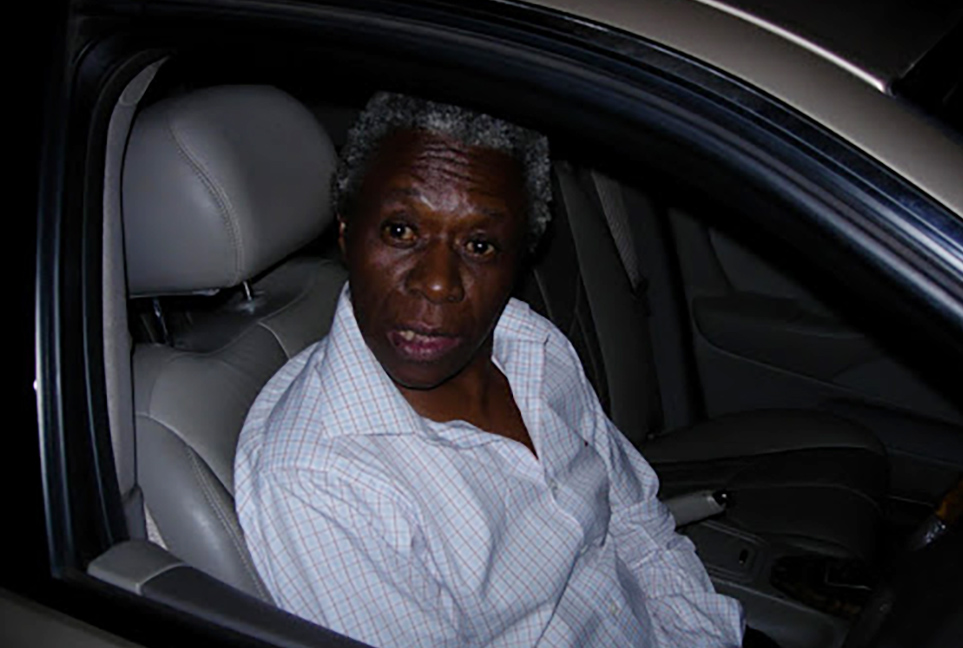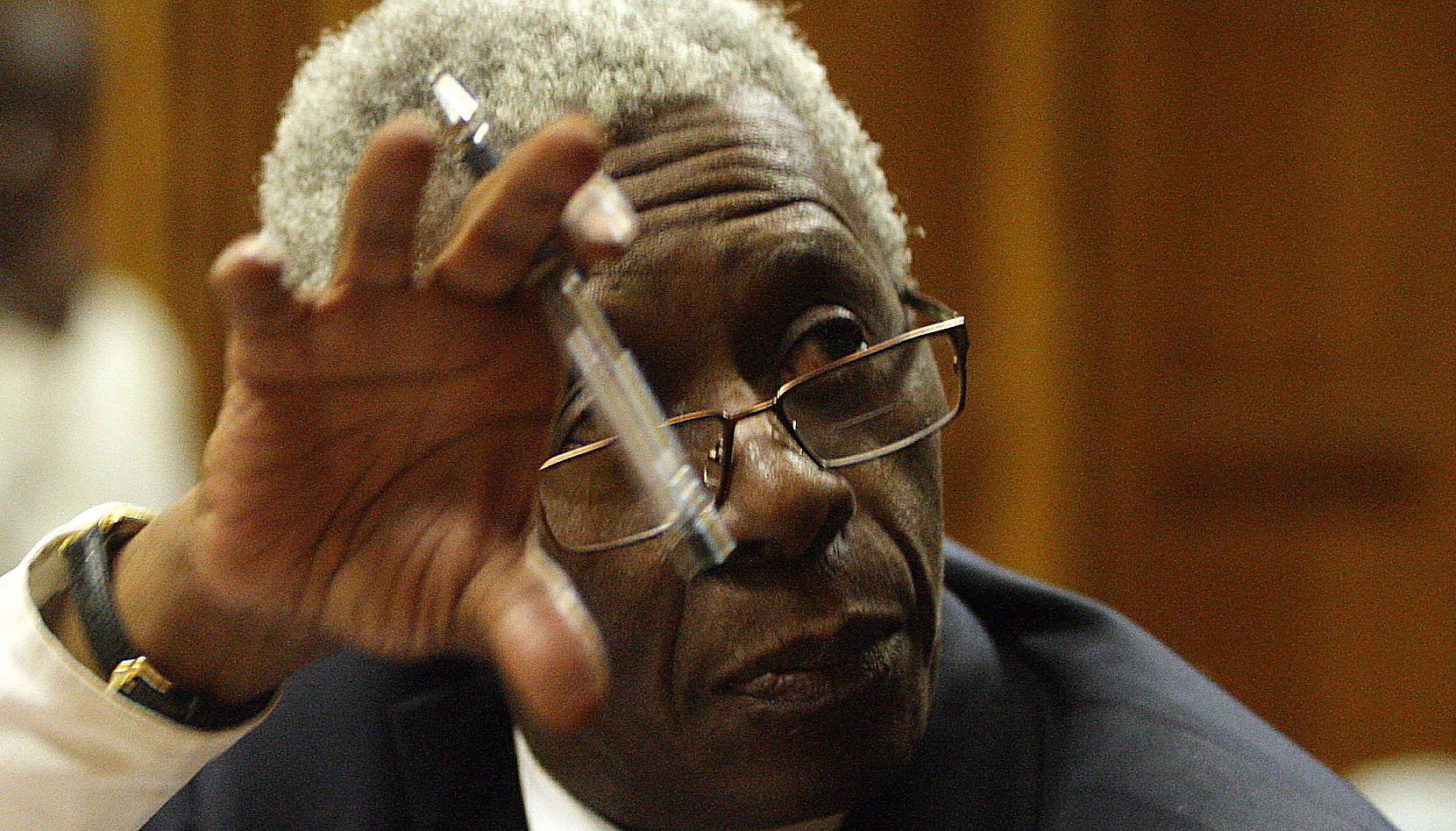Former high court judge Nkola Motata has approached the Constitutional Court to challenge his removal as a judge, which came 17 years after he crashed into a wall while driving drunk.
Now aged 77, Motata retired as a judge in 2017 after a lengthy leave of absence, all the while being paid by the state. He would have continued to receive a salary from the state for the rest of his life if the National Assembly had not impeached him in February 2024.
Now he has approached the Constitutional Court, requesting direct access, to have his status as judge reinstated. Motata wants the National Assembly resolution, which called for his removal as a judge, to be declared invalid and set aside. He also wants the decision to remove him, taken by President Cyril Ramaphosa, to be declared invalid and set aside.
Motata was impeached alongside former Western Cape judge president John Hlophe, who recently entered politics as a member of Parliament for the uMkhonto Wesizwe party.
Ramaphosa and Parliament have indicated that they plan to oppose the application while the Judicial Service Commission (JSC) says it will abide by the court’s decision.
Double jeopardy
In an affidavit before the court, Motata puts forward several grounds for challenging his removal. He argues that the National Assembly lacked the jurisdiction to remove him and was motivated by misrepresentation.
Motata also argues that he is being subjected to “double jeopardy”, a legal principle that says you can’t be punished for the same crime twice.
The JSC set up a Conduct Tribunal that found Motata guilty of gross misconduct, an offence that could lead to impeachment. However, after considering the Tribunal’s report, the JSC only found Motata guilty of misconduct, an offence that does not lead to dismissal. The JSC ordered him to pay a fine of just over R1.1-million, which went to the South African Judicial Education Institute.
The JSC’s finding of misconduct was challenged by Freedom Under Law and the Supreme Court of Appeal ruled that the JSC should have found Motata guilty of misconduct in line with the Conduct Tribunal’s finding.
Motata argues that although he raised the issue of double jeopardy, it was not dealt with effectively by Parliament when he was impeached.
“The rejection of the argument of double jeopardy in relation to the fine imposed and already paid by me was unjustified and legally unsustainable.
“The principle of double jeopardy emanates from our common law. Double jeopardy or double punishment applies in instances where a particular sanction has been enforced, and then subsequently a further or harsher sanction is enforced for that same act of misconduct.
“I was punished by paying the hefty fine out of my pension payout. I may not be able to recover the sum from the JSC or South African Judicial Education Institute, yet I would still be removed from office as a punishment. The double jeopardy rule was introduced to prevent such unjust eventuality,” he said.
SCA ruling
While Motata is not appealing against the SCA ruling, he appears to be challenging it in a roundabout way. He argues that he is requesting direct access to the Constitutional Court because the SCA judgment is “central to the issues in this matter”. He says approaching the high court would amount to questioning the SCA’s decision.
“The matter involves not only the JSC but pronouncements made by the Chief Justice in his capacity as its chairperson and which were later ratified by the JSC. It would appear demeaning for a single judge to reevaluate those pronouncements, especially if the conclusion would be contrary thereto,” he says in explaining why he has approached the Constitutional Court.
Motata says the impeachment of a judge is “a matter of national importance and general public interest”.
“It also involves constitutional issues since the inception of the constitutional democracy in South Africa. I am the first, alongside Judge President Hlophe, to undergo such a process as a judge.”
Motata says the SCA’s ruling has serious implications for him, whether he chooses to participate in the initial case or not.
“The SCA, fully aware that its decision whether correct or not is binding on all persons affected thereby until set aside by a court of competent authority, failed to afford me a hearing before the substitution order was made. This infringed upon my right to a fair hearing. That I did not participate in the appeal proceedings is no justification for the SCA to deny me such right in circumstances it was considering making an order adversely affects my rights,” he says.
He says Parliament should have considered the question of double jeopardy when it took its decision.
Motata also says that by making a ruling to substitute the JSC’s decision with one of gross misconduct, the SCA violated the principle of separation of powers.
“Allowing the SCA or any court to take over the function of such an important constitutional institution would by itself be a serious indictment to and a travesty of our Constitution. Furthermore, the SCA judgment undermines the constitutional safeguards created by the legislature in matters involving the removal of a judge from office. Judges, being human, may, if given a power to decide on the fate of their colleagues, as happened in this case, be tempted to use this power to protect one of their own or, at worst, to settle scores.”
Read more: The Motata ruling – Structural and human problems behind failure of JSC to protect integrity of judicial system
Parliament process
Motata is also critical of Parliament’s approach, saying it should not have made the decision to impeach him without a correlating JSC finding of gross misconduct. Motata notes that when Chief Justice Raymond Zondo submitted his report to Parliament, he “made it clear that the SCA had by implication set aside the JSC’s decision but did not want the JSC to consider the matter afresh and the JSC is precluded from doing so”.
“He also emphasised that ‘the JSC did not itself make a finding that Judge NJ Motata is guilty of gross misconduct’.
“The parliamentary committee then recommended my removal from office to the National Assembly notwithstanding that no finding of gross misconduct had been made by the JSC,” Motata said.
He also questions some statements made by the Justice Committee in its report on his impeachment to the National Assembly.
“In its written recommendation to the National Assembly, the Parliamentary Committee deliberately gave an impression that the JSC had ratified the finding of gross misconduct by the SCA and that the JSC had effectively confirmed the jurisdiction of the National Assembly. This assertion is not contained in the Chief Justice’s letter and/or the JSC’s report or minutes, nor can it be read into them by any stretch of the imagination. lt is therefore a misrepresentation of fact,” he says.
Motata adds that the National Assembly was “induced” to vote in favour of his impeachment through false statements.
“In the circumstances, the resolution of the National Assembly is void, having been induced by misrepresentation of fact.”
Long road to impeachment
Motata’s impeachment was several years in the making, with his car accident having taken place in 2007. He was tried criminally and convicted of drunk driving and paid a R20,000 fine.
 Judge Nkolo Motata in his vehicle at the scene of the accident on 16 January 2007 where he crashed his car into the boundary wall of Richard Baird’s Hurlingham, Johannesburg, home. (Photo: Supplied)
Judge Nkolo Motata in his vehicle at the scene of the accident on 16 January 2007 where he crashed his car into the boundary wall of Richard Baird’s Hurlingham, Johannesburg, home. (Photo: Supplied)
Lobby group AfriForum lodged a complaint with the JSC over Motata’s conduct at the scene of the accident, alleging that Motata had made racist remarks towards Richard Baird after crashing into his wall. Some of these remarks had been caught on tape.
In 2023, the SCA noted that Motata never apologised for his conduct and the JSC should have considered the impact his remaining in office would have on public confidence in the judiciary.
“It appears that he failed, even after finalisation of the criminal trial, to appreciate that he had engaged in misconduct of a most serious kind. This reveals both his lack of insight and his lack of appreciation for his misconduct on the public confidence in the judiciary,” Judge Visvanathan Ponnan wrote in the majority judgment.
“Judge Motata’s conduct was egregious… his behaviour at the scene of the incident was characterised by racism, sexism and vulgarity. The public watched him conduct a dishonest defence during his trial and on appeal. They watched him dishonestly accuse Mr Baird of using the k-word, only to thereafter withdraw the accusation,” Ponnan noted. DM




 Judge Nkolo Motata in his vehicle at the scene of the accident on 16 January 2007 where he crashed his car into the boundary wall of Richard Baird’s Hurlingham, Johannesburg, home. (Photo: Supplied)
Judge Nkolo Motata in his vehicle at the scene of the accident on 16 January 2007 where he crashed his car into the boundary wall of Richard Baird’s Hurlingham, Johannesburg, home. (Photo: Supplied)